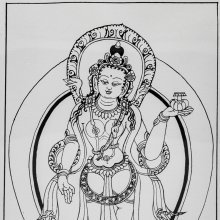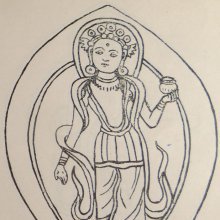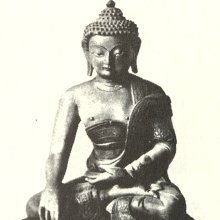Sarthavaha, Sārthavāha, Sartha-vaha: 14 definitions
Introduction:
Sarthavaha means something in Buddhism, Pali, Hinduism, Sanskrit, the history of ancient India. If you want to know the exact meaning, history, etymology or English translation of this term then check out the descriptions on this page. Add your comment or reference to a book if you want to contribute to this summary article.
Images (photo gallery)
In Hinduism
Jyotisha (astronomy and astrology)
Source: Wisdom Library: Brihat Samhita by VarahamihiraSārthavāha (सार्थवाह) refers to “pilgrim parties”, according to the Bṛhatsaṃhitā (chapter 4), an encyclopedic Sanskrit work written by Varāhamihira mainly focusing on the science of ancient Indian astronomy astronomy (Jyotiṣa).—Accordingly, “If the two horns of the moon should appear but slightly raised and far from each other presenting the appearance of a boat, she brings trouble on the sailors but prosperity on mankind at large. [...] If, when the northern horn is a little higher than the other and bent aside, the southern horn is straight like a carriage pole, pilgrim parties [i.e., sārthavāha] will suffer and there will be no rain. If one of the horns should appear higher than the other and bent down at the end, cows will suffer”.

Jyotisha (ज्योतिष, jyotiṣa or jyotish) refers to ‘astronomy’ or “Vedic astrology” and represents the fifth of the six Vedangas (additional sciences to be studied along with the Vedas). Jyotisha concerns itself with the study and prediction of the movements of celestial bodies, in order to calculate the auspicious time for rituals and ceremonies.
In Buddhism
Mahayana (major branch of Buddhism)
Source: Wisdom Library: Maha Prajnaparamita SastraSārthavāha (सार्थवाह) is one of the Bodhisattvas accompanying the Buddha at Rājagṛha on the Gṛdhrakūṭaparvata, mentioned in a list of twenty-two in to Mahāprajñāpāramitāśāstra chapter 13.—They were at the head of countless thousands of koṭinayuta of Bodhisattva-mahāsattvas who were all still awaiting succession and will still accede to Buddhahood. He is also known as Tao che.
Sārthavāha is one of the sixteen classified as a lay (gṛhastha) Bodhisattva: Sārthavāha, of the vaiśya caste, lives in Chö p’o t’i (Śravāstī).
Source: academia.edu: A Study and Translation of the GaganagañjaparipṛcchāSārthavāha (सार्थवाह) refers to a “caravan leader”, according to the Gaganagañjaparipṛcchā: the eighth chapter of the Mahāsaṃnipāta (a collection of Mahāyāna Buddhist Sūtras).—Accordingly, “Then on that occasion the Lord uttered these verses: [...] (113) Not being attached to this side nor that side, sailing the vessel of the dharma, and liberating living beings without any idea of them, that is called the sameness of the Bodhisattva (114) He who knows that the three realms are just like a wilderness which is void and unchangeable, but who still liberates living beings according to regular order, he is a caravan leader (sārthavāha) who guides the way to ambrosia. [...]”.

Mahayana (महायान, mahāyāna) is a major branch of Buddhism focusing on the path of a Bodhisattva (spiritual aspirants/ enlightened beings). Extant literature is vast and primarely composed in the Sanskrit language. There are many sūtras of which some of the earliest are the various Prajñāpāramitā sūtras.
Tibetan Buddhism (Vajrayana or tantric Buddhism)
Source: archive.org: The Indian Buddhist IconographySārthavāha (सार्थवाह) or Sārthavāhalokeśvara refers to number 74 of the 108 forms of Avalokiteśvara found in the Machhandar Vahal (Kathmanu, Nepal). [Machhandar or Machandar is another name for for Matsyendra.].
Accordingly,—
“Sārthavāha is similar to [Piṇḍapātra Lokeśvara] in all respects, except that here the god displays the Varada mudrā in his right hand, and carries the Piṇḍapātra (the bowl) in his left.—Piṇḍapātra Lokeśvara is one-faced and two-armed and stands on a lotus. He holds the Piṇḍapātra (the bowl) in his two hands near the navel”.
The names of the 108 deities [viz., Sārthavāha] possbily originate from a Tantra included in the Kagyur which is named “the 108 names of Avalokiteshvara”, however it is not yet certain that this is the source for the Nepali descriptions. Tibetan Buddhism includes schools such as Nyingma, Kadampa, Kagyu and Gelug. Their primary canon of literature is divided in two broad categories: The Kangyur, which consists of Buddha’s words, and the Tengyur, which includes commentaries from various sources. Esotericism and tantra techniques (vajrayāna) are collected indepently.
India history and geography
Source: Cologne Digital Sanskrit Dictionaries: Indian Epigraphical GlossarySārthavāha.—(IE 8-3; EI 24, 31; BL; LL), a trader, a mer- chant; designation of a member of the mercantile community represented on an administrative board like the Pañcāyat. Note: sārthavāha is defined in the “Indian epigraphical glossary” as it can be found on ancient inscriptions commonly written in Sanskrit, Prakrit or Dravidian languages.

The history of India traces the identification of countries, villages, towns and other regions of India, as well as mythology, zoology, royal dynasties, rulers, tribes, local festivities and traditions and regional languages. Ancient India enjoyed religious freedom and encourages the path of Dharma, a concept common to Buddhism, Hinduism, and Jainism.
Languages of India and abroad
Sanskrit dictionary
Source: DDSA: The practical Sanskrit-English dictionarySārthavāha (सार्थवाह).—the leader of a caravan, a merchant, trader; Ś.6.
Derivable forms: sārthavāhaḥ (सार्थवाहः).
Sārthavāha is a Sanskrit compound consisting of the terms sārtha and vāha (वाह). See also (synonyms): sārthavāhana.
Source: Cologne Digital Sanskrit Dictionaries: Edgerton Buddhist Hybrid Sanskrit DictionarySārthavāha (सार्थवाह).—(1) name of a son of Māra (favorable to the Bodhisattva): Mahāvastu ii.327.17; 330.5; Lalitavistara 44.11; 303.19; 304.7, 17; 305.4, 308.20; (2) name of a Bodhisattva: Śikṣāsamuccaya 145.16, quoted from Dharmasaṃgīti; (3) name of a yakṣa: Mahā-Māyūrī 26.
Source: Cologne Digital Sanskrit Dictionaries: Shabda-Sagara Sanskrit-English DictionarySārthavāha (सार्थवाह).—m.
(-haḥ) 1. A merchant, a trader. 2. The leader of a caravan. E. sārtha a company, a caravan, and vah to bear, aff. aṇ.
Source: Cologne Digital Sanskrit Dictionaries: Benfey Sanskrit-English DictionarySārthavāha (सार्थवाह).—m. 1. the leader of a caravan, [Pañcatantra] 9, 1. 2. a great merchant, [Mṛcchakaṭikā, (ed. Stenzler.)] 2, 3. 3. a merchant.
Sārthavāha is a Sanskrit compound consisting of the terms sārtha and vāha (वाह).
Source: Cologne Digital Sanskrit Dictionaries: Cappeller Sanskrit-English DictionarySārthavāha (सार्थवाह).—[masculine] the same.
Source: Cologne Digital Sanskrit Dictionaries: Monier-Williams Sanskrit-English Dictionary1) Sārthavāha (सार्थवाह):—[=sārtha-vāha] [from sārtha] m. the leader or conductor of a c°, a merchant, trader, [Mahābhārata; Kāvya literature] etc.
2) [v.s. ...] the son of Māra (= māra-putra), [Buddhist literature]
3) [v.s. ...] a Bodhi-sattva, [ib.]
Source: Cologne Digital Sanskrit Dictionaries: Yates Sanskrit-English DictionarySārthavāha (सार्थवाह):—[sārtha-vāha] (haḥ) 1. m. The leader of a caravan; a merchant, trader.
[Sanskrit to German]
Sanskrit, also spelled संस्कृतम् (saṃskṛtam), is an ancient language of India commonly seen as the grandmother of the Indo-European language family (even English!). Closely allied with Prakrit and Pali, Sanskrit is more exhaustive in both grammar and terms and has the most extensive collection of literature in the world, greatly surpassing its sister-languages Greek and Latin.
Kannada-English dictionary
Source: Alar: Kannada-English corpusSārthavāha (ಸಾರ್ಥವಾಹ):—
1) [noun] = ಸಾರ್ಥನಾಥ [sarthanatha].
2) [noun] a merchant.
Kannada is a Dravidian language (as opposed to the Indo-European language family) mainly spoken in the southwestern region of India.
See also (Relevant definitions)
Partial matches: Vaha, Shartha.
Starts with: Sarthavahaka, Sarthavahalokeshvara, Sarthavahana, Sarthavahavacas.
Ends with: Susarthavaha.
Full-text (+4): Sarthavahavacas, Sarthavahana, Carttavakan, Susarthavaha, Tumburu, Sarthabhrit, Sarthapati, Shartha, Ativaha, Karnadhara, Sarthavahini, Sarthadhara, Sarthavahalokeshvara, Yoddhar, Vaha, Vara, Adikarmika, Abhaya, Kulika, Kumari.
Relevant text
Search found 11 books and stories containing Sarthavaha, Sārthavāha, Sartha-vaha, Sārtha-vāha; (plurals include: Sarthavahas, Sārthavāhas, vahas, vāhas). You can also click to the full overview containing English textual excerpts. Below are direct links for the most relevant articles:
Amarakoshodghatana of Kshirasvamin (study) (by A. Yamuna Devi)
Economics (1): Trade and commerce < [Chapter 3 - Social Aspects]
The Indian Buddhist Iconography (by Benoytosh Bhattachacharyya)
Amaravati Art in the Context of Andhra Archaeology (by Sreyashi Ray chowdhuri)
Donative inscriptions from Amarāvatī (conclusion) < [Chapter 4 - Survival of Amarāvatī in the Context of Andhra Art]
Trading routes of Amarāvatī-Dhānyakaṭaka < [Chapter 4 - Survival of Amarāvatī in the Context of Andhra Art]
Maha Prajnaparamita Sastra (by Gelongma Karma Migme Chödrön)
The 22 main Bodhisattvas < [Chapter XIII - The Buddha-fields]
III. There is no boastfulness in the buddha < [Part 3 - Appendices to the ten powers]
Bodhisattva quality 26: concentration commemorating the Buddhas < [Chapter XIII - The Buddha-fields]
Dasarupaka (critical study) (by Anuru Ranjan Mishra)
Part 3-6 - Prakaraṇa rules < [Chapter 10 - Prakaraṇa (critical study)]
Malatimadhava (study) (by Jintu Moni Dutta)
Part 1b - The Date of Bhavabhūti < [Chapter 1 - Introduction]


